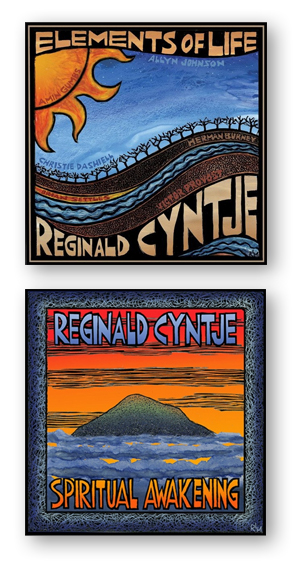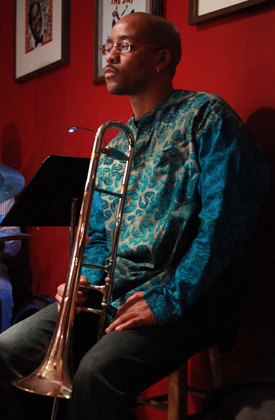The Music Man
[rev_slider Jazz]
In February 2015, listeners to NPR’s Jazz Night in America got a taste of something Washington, DC, jazz lovers have enjoyed for years: the innovative sound of trombonist Reginald Cyntje.
Cyntje was taking a risk when he stood center stage in the Bohemian Caverns that January night and blew the first baritone notes on his horn. His band would be playing material from his not-yet-released album, Spiritual Awakening, his fourth and, some critics say, his best album. This was music the band had never rehearsed. The first time the musicians would play it would be here, in this cave-like club, before a national audience, but Cyntje wanted the freshest sounds they could produce.
What unfolded was magic: a blending of contemporary jazz with Caribbean influences, from funky reggae bass lines to calypso steel pans to the improvisational sound of quelbe, the homegrown music of the Virgin Islands where Cyntje was raised.
“I grew up in the Caribbean,” says Cyntje, 40, an adjunct music professor at the College’s Germantown Campus. Cyntje lives in Silver Spring with his wife and three children. He has close-cropped hair, a hint of a goatee, and a taste for bright-patterned shirts. “I grew up hearing reggae and calypso music. My elders always mixed jazz with their cultural heritage.” His music blends all the music he’s come into contact with, he says. “One of my vocalists said it sounds like Bach meets Frank Zappa.”
This unique sound has won Cyntje accolades. The DC jazz blog CapitalBop named Spiritual Awakening one of the top albums of 2015, and his previous album, Elements of Life, one of the top albums of 2014. The Washington City Paper named him the best jazz composer of 2015 and regularly lists him as the city’s top jazz trombonist. WAMU public radio’s music website Bandwidth named his song “Rejoice” one of its 50 favorite DC songs last year.

The DC jazz blog CapitalBop named Spiritual Awakening one of the top albums of 2015, and his previous album, Elements of Life, one of the top albums of 2014.
It didn’t happen overnight. Born on the Caribbean island of Dominica and raised on St. Thomas, in the US Virgin Islands, Cyntje took to the trombone in seventh grade. Most of the girls went for flutes and clarinets. The boys went for trumpets and saxophones. Cyntje was drawn to the trombone in part because it was a different, and in part because it was an instrument he had seen men around him play.
He practiced furiously. Cyntje started eighth grade in the last chair of the school band’s trombone section. In three weeks, he took the first chair. The next year he was playing in a university band.
In school he learned classical music, but when a friend lent him a Miles Davis album, he fell for jazz. His father started taking him to clubs where he listened as longtime island musicians mixed Caribbean stylings with mainstream jazz.
“I fell in love with jazz,” Cyntje says, “so that was my path.”
That path brought him to the mainland. To Boston, where he studied at the Berklee College of Music between 1993 and 1995, and then dropped out to play professionally. To New York, where he cut his chops in the city’s jazz clubs. To Washington, DC, where the city’s diverse cultures seemed to mix more than he felt they did in New York.
Eventually, in 2011, Cyntje enrolled at Montgomery College, where he wrapped up his general education requirements before transferring to the University of the District of Columbia to get his bachelor’s degree in jazz studies. Having previously served in the National Guard, Cyntje enlisted and spent three years in the Army at Maryland’s Aberdeen Proving Ground, where he played in its well-regarded jazz band. He earned his master’s in jazz from the University of Maryland in 2015, having already become a fixture in DC’s jazz clubs.
In his Jazz History and History of Popular Music classes, Cyntje has an easy rapport with students, whether he’s talking about Beethoven or bebop, the Grateful Dead or grunge. He likes to arrange the chairs in what he calls a “circle of love” to promote discussion. Being a musician helps him in the classroom, he says. A musician has to connect with the audience, he says. A teacher has to connect with the students.

A fixture in area jazz clubs, Cyntje recently played with the Tim Whalen Septet at Twins Jazz in DC. By day, Cyntje teaches Jazz History and History of Popular Music at Germantown, and runs the Jegna School of Music in Silver Spring.Photos by Rick Reinhard.
“Doctor,” the student says, smiling. “I like that.”
A sense of spirituality and activism infuses his jazz, and his teaching career, too. In Silver Spring, he runs the Jegna School of Music, where professional musicians meet one on one with students. It’s part of the “each one teach one” philosophy he was raised on, Cyntje says. The name Jegna comes from an Amharic word translated as a bearer of culture—someone who passes cultural knowledge from one generation to the next.
That notion comes across in Cyntje’s gentle islander patois, and in his music. As his trombone played across the room that January night at Bohemian Caverns, the cultural traditions of the Virgin Islands seemed to fill the room and reach out across the radio to NPR listeners.
“He is somebody who speaks from the heart,” Russonello says—a quality that seems to move Cyntje’s listeners as much as his students.
For more on Reginald Cyntje , visit http://www.reginaldcyntje.com/.
—David Frey


